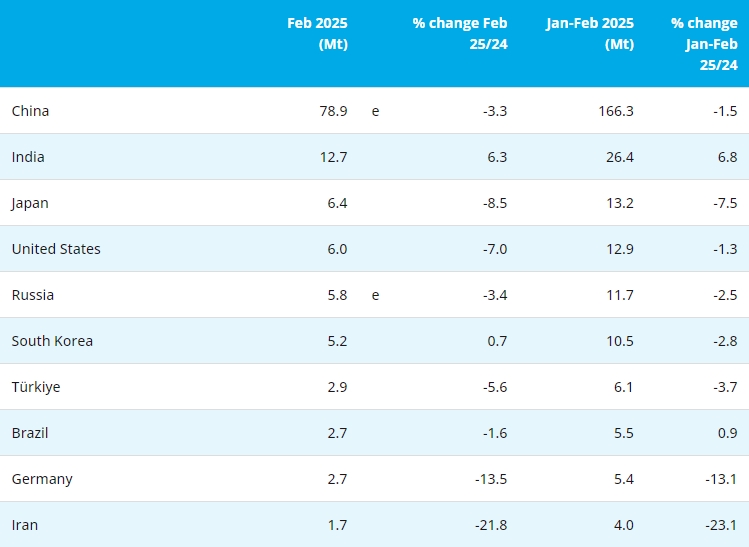[ferro-alloys.com]Crude steel production in Arab countries is expected to increase this year to around 29 million metric tons, up from the 28.2 million mt produced in 2019, mainly triggered by new production in North African countries, Kamel Djoudi, Arab Iron & Steel Union Federation (AISU)'s Secretary General, told S&P Global Platts in a telephone interview Thursday.
"We estimated an increase in crude production triggered by the North African countries and especially by Egypt and Algeria, but these are estimates as we don't know yet if there will be any impact in terms of production and consumption from the coronavirus," Djoudi said. "As we all know, China is one of the major suppliers of raw materials and final products; [there are likely to be repercussions] due to coronavirus, especially in the upcoming orders and shipments.
"I believe that it is too early to estimate the impact, but it is certain it will have direct repercussions on the steel industry...and an indirect impact on oil prices and consequences on the Arab countries as oil producers."
Egypt and Algeria are expected to boost Arab steel output, as they did last year. "The Egyptian government has taken over the last few years a range of measures which encouraged the domestic steel industry – for example, applying a customs safeguard of 15% for billet products and 25% for rebar for three years until October 2022, which has decreased steel imports, and therefore, created more opportunities for [domestic] mills," he said. He added that new mills were established in Egypt that are ramping up to production this year, such as the new 2 million mt/year capacity of Swiss Solb-Bechai Steel.
In Libya, the country's largest steel producer, Lisco, despite a challenging political situation, is expected to continue to increase its production. This was underscored by the latest data published by the World Steel Association on Tuesday that showed a 123.7% year-on-year increase in January production to 65,000 mt.
In the Gulf Area and East Mediterranean countries, production is expected to stay even with 2019 at 15.8 million mt. According to Djoudi, there will be not an increase in production due to the completion of special projects such as Expo 2020 Dubai, infrastructure expansion in Mecca, Saudi Arabia, and stadium construction for World Cup 2022 in Qatar.
Steel consumption in North Africa countries for 2020 is expected to increase to 19.4 million mt from the 18.5 million mt registered in 2019, mainly due to Egypt and Algeria's demand for steel products as long and flat steel demand, respectively, are forecast to reach around 10.5 million mt and 4.5 million mt.
"In Algeria for example there are plans for the construction of more than one million houses; the east-west motorway. Production and supply will be balanced by imports, although the government will probably introduce some safeguards to limit them too," said Djoudi. He also noted how the Egyptian government has planned to boost the construction sector as well.
Djoudi said the use of direct-reduced iron (DRI) is critical for Arab steelmakers, accounting for 37% of steel production. He expects the usage to expand, noting that Egypt has reduced the price of natural gas by 25% to encourage DRI production.
(S&P Global Platts)
- [Editor:王可]



 Save
Save Print
Print Daily News
Daily News Research
Research Magazine
Magazine Company Database
Company Database Customized Database
Customized Database Conferences
Conferences Advertisement
Advertisement Trade
Trade








 Online inquiry
Online inquiry Contact
Contact

Tell Us What You Think